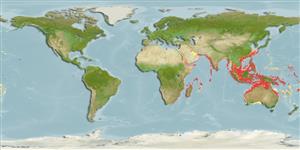Common names from other countries
Environment: milieu / climate zone / depth range / distribution range
Ecologia
marinhas; estuarina associadas(os) a recifes; oceanódromo (Ref. 51243); intervalo de profundidade 20 - 200 m (Ref. 28016), usually ? - 60 m (Ref. 90102). Tropical; 27°N - 37°S, 29°E - 152°E
Indo-West Pacific: Red Sea (Ref. 12541) south to the southeastern coast of South Africa and east to New Caledonia and Vanuatu. Recently reported from Tonga (Ref. 53797). Due to a widespread confusion with Sphyraena putnamae and Sphyraena qenie, the exact range is uncertain.
Tamanho / Peso / Idade
Maturity: Lm ? range ? - ? cm
Max length : 150 cm TL macho/indeterminado; (Ref. 2871); common length : 120 cm TL macho/indeterminado; (Ref. 5450); peso máx. publicado: 11.5 kg (Ref. 40637)
Espinhos dorsais (total) : 6; Raios dorsais (total) : 9; Espinhos anais: 2; Raios anais : 7 - 9. Body with dark bars crossing lateral line, each bar oblique in upper half, but nearly vertical in lower half; caudal fin largely yellowish.
Found near prominent current-swept lagoon or seaward reefs (Ref. 9710); also in bays, estuaries and turbid inner lagoons (Ref. 9768). Diurnal and solitary, although the young form schools. Feeds mainly on fishes but also takes squid. Sold fresh, frozen or dried salted. Reports of ciguatera poisoning need confirmation.
Ciclo de vida ou comportamento de acasalamento
Maturities | Reprodução | Spawnings | Egg(s) | Fecundities | Larvas
De Sylva, D.P. and F. Williams, 1986. Sphyraenidae. p. 721-726. In M.M. Smith and P.C. Heemstra (eds.) Smiths' sea fishes. Springer-Verlag, Berlin. (Ref. 5491)
Status na Lista Vermelha da UICN (Ref. 130435)
CITES (Ref. 128078)
Not Evaluated
Ameaça para os humanos
Reports of ciguatera poisoning (Ref. 31637)
Uso pelos humanos
Pescarias: espécies comerciais; peixe esportivo: sim
Ferramentas
Relatórios especiais
Baixar XML
Fontes da internet
Estimates based on models
Preferred temperature (Ref.
115969): 23.6 - 28.5, mean 27.3 (based on 442 cells).
Índice de diversidade filogenética (Ref.
82804): PD
50 = 0.5000 [Uniqueness, from 0.5 = low to 2.0 = high].
Bayesian length-weight: a=0.00724 (0.00609 - 0.00862), b=2.92 (2.88 - 2.96), in cm Total Length, based on LWR estimates for this species (Ref.
93245).
Nível Trófico (Ref.
69278): 4.5 ±0.6 se; based on diet studies.
Resiliência (Ref.
120179): Baixo, tempo mínimo de duplicação da população 4,5 - 14 anos (K=0.10).
Fishing Vulnerability (Ref.
59153): Very high vulnerability (75 of 100).
Climate Vulnerability (Ref.
125649): High to very high vulnerability (73 of 100).
